译林版英语八年级下册Unit 5 Reading 1 教案
- 格式:doc
- 大小:52.50 KB
- 文档页数:7
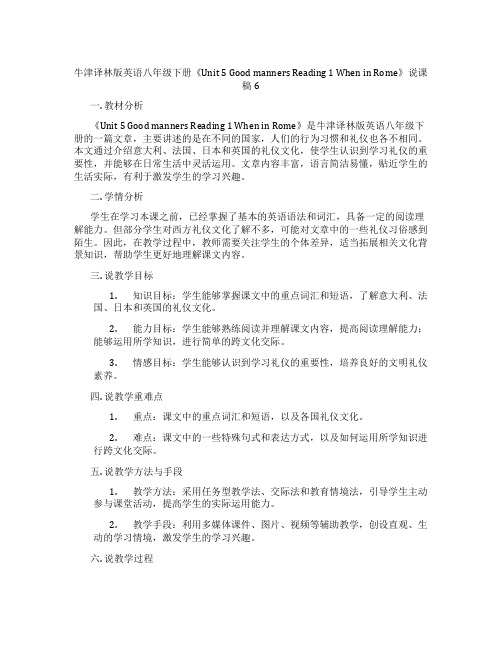
牛津译林版英语八年级下册《Unit 5 Good manners Reading 1 When in Rome》说课稿6一. 教材分析《Unit 5 Good manners Reading 1 When in Rome》是牛津译林版英语八年级下册的一篇文章,主要讲述的是在不同的国家,人们的行为习惯和礼仪也各不相同。
本文通过介绍意大利、法国、日本和英国的礼仪文化,使学生认识到学习礼仪的重要性,并能够在日常生活中灵活运用。
文章内容丰富,语言简洁易懂,贴近学生的生活实际,有利于激发学生的学习兴趣。
二. 学情分析学生在学习本课之前,已经掌握了基本的英语语法和词汇,具备一定的阅读理解能力。
但部分学生对西方礼仪文化了解不多,可能对文章中的一些礼仪习俗感到陌生。
因此,在教学过程中,教师需要关注学生的个体差异,适当拓展相关文化背景知识,帮助学生更好地理解课文内容。
三. 说教学目标1.知识目标:学生能够掌握课文中的重点词汇和短语,了解意大利、法国、日本和英国的礼仪文化。
2.能力目标:学生能够熟练阅读并理解课文内容,提高阅读理解能力;能够运用所学知识,进行简单的跨文化交际。
3.情感目标:学生能够认识到学习礼仪的重要性,培养良好的文明礼仪素养。
四. 说教学重难点1.重点:课文中的重点词汇和短语,以及各国礼仪文化。
2.难点:课文中的一些特殊句式和表达方式,以及如何运用所学知识进行跨文化交际。
五. 说教学方法与手段1.教学方法:采用任务型教学法、交际法和教育情境法,引导学生主动参与课堂活动,提高学生的实际运用能力。
2.教学手段:利用多媒体课件、图片、视频等辅助教学,创设直观、生动的学习情境,激发学生的学习兴趣。
六. 说教学过程1.导入:教师通过展示各国礼仪图片,引导学生谈论各自对礼仪的认识,引出本课主题。
2.自主学习:学生阅读课文,完成相关练习,巩固所学知识。
3.课堂讨论:学生分小组讨论课文内容,分享学习心得,教师巡回指导。

译林牛津版八年级英语下册Unit5知识点总结提纲(含默写纸)8B Unit 5知识点1. 礼貌,礼仪,规矩n. (复数) manners注意礼貌Mind your manners.2. 打断(谈话),插嘴cut in (on sb./sth.)不要打断别人的话Don’t cut in on others.3. 礼貌地adv. politely 反义词impolitelyadj. polite 反义词impolite礼貌地等轮到你wait politely until it’s your turn他给别人让座太有礼貌了it’s polite of him to give a seat to others4. 垃圾,杂物n(不可数名词) /v litter不要乱扔垃圾don’t drop litter everywhere禁止乱扔垃圾no littering5. 水龙头,旋塞n. tapLeave n. +adj/doing/adv/prep留水龙头趟水leave the tap running 留灯开着leave the light on留门开着leave the door open把钥匙忘在车上了leave the key in the car 注意有地点不能用forget6. 流动vi run (run – ran – run)跑得快run fast经营一家企业run a business7. 采,摘vt. pick 在公园摘花pick flowers in the park捡起某物pick up sth pick sth up 注意:捡起它pick it up顺带某人pick sb. up 选另一个城市pick another city8. 遵守,顺从vt. obey ving obeying 三单obeysobey- obeyed- obeyed 反义词disobey 顺从某人做某事obey sb. to do sth遵守交通规则obey traffic rules他顺从老师按时交作业He obeys the teacher to hand in homework on time9.(人、车等)排队等候queue n./vqueuing queued他正排队等车he is queuing for the bus 插队jump the queue10.(轮流的)顺序n. turn v. 变得;转向轮到你擦黑板了It’s your turn to clean the blackboard 轮流做某事take turns to do sth天变热了it’s turning hot 向某人求助turn to sb.打开(电器)turn on 关闭turn off 调高(声音)turn up 调低turn down11. 符合习俗的,正确的adj. proper adv. properly 反义词improperly正确和别人打招呼的方式the proper way to greet others the proper way of greeting others我们应当饮食适当we should eat and drink properly12. 问候,打招呼vt. greet Ving greeting相互问候greet each other英国人经常用亲吻和亲戚打招呼british people often greet relatives with a kiss13. 与某人握手shake sb’s hand Shake v/n = shaking shake- shook – shaken感到轻微的震动feel the slight shake/ shaking 摇摇头shake one’s head 晃动身体shake one’s body 14. 亲吻n./ v. kiss 复数kisses用亲吻互相问候greet each other with a kiss greet each other by kissing15. 亲密的;严密的adj. close- closer- closest v. 关闭close adj. 关着的closedadv. 靠近地close adv. 密切地closely商店星期天关门the shop is closed on Sundays.他是我最亲密的朋友he is my closest friend我住在学校附近I live near (to) my school. I live close to my school.密切地观察珍稀鸟类watch the rare birds closely16.(非正式)交谈,谈话n. conversation (可数)用有关天气的话题开始谈话start a conversation with the subjects about weather17. 避免vt. avoid避免某事avoid sth 避免做某事avoid doing sth请避免年龄体重之类的话题please avoid subjects like age or weight.避免在公共场合吸烟avoid smoking in public18. 话题,主题n. subject (可数)学科,科目你想选修哪门学科which subject would you choose to study?谈论音乐,书,或其他什么话题talk about subjects like music, books or something else.19. 表现vt/vi behave n. behavior (不可数)放规矩点behave yourself 表现礼貌behave politely 多么好的表现what good behavior 20. 民主,群众n / adj 公开的,公共的public公开地,在别人面前in public公众场所请勿大声喧哗don’t talk loudly in public/ in public places21. 推,挤push 插队,加塞push in/ cut in拉,拽pull 向岩石上攀爬pull oneself up插队到别人前面是粗鲁的It’s rude to push in before others他们不会碰到你,或从你旁边推挤过去they will not touch you or push past you.22. 撞,碰vi bump n. 保险杠bumper如果他们撞到某人,他们会说抱歉if they bump into someone, they will say sorry.撞进,撞上crash into (冲击力更强)23. 挡住某人的路in one’s way用这种方法in this way 用不同方法in different ways用另一种方法in a different ways in another way打扰一下,你挡住我的路了excuse me, you are in my way去某地的路上on the/one’s way to 在某种程度上in some ways 无论如何anyway 顺便说下by the way在许多方面in many ways 绝不in no way24. 触摸vt./n touch 复数touches温柔的抚摸gentle touches温柔地抚摸我的狗touch my dog gently触动,感动vt adj. 令人感动的,感人的touching 感动的touched 我被这部感人的电影感动到了。


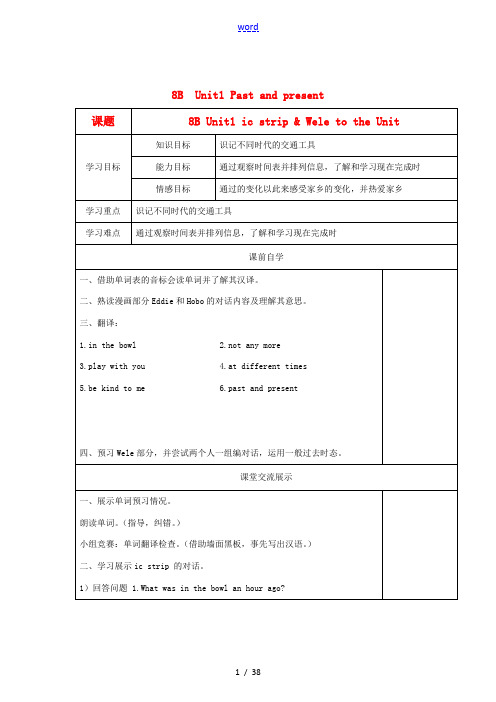
8B Unit1 Past and present8B Units1导学案参考答案Unit1第一课时:一、1.was 2.has eaten 3.to have 4.to play 5.is eating 6.took 7.rode8.will be二、1.would like , grows up 2.walks to school 3.goes to work by bus 4.flies to5.don’t want to any more第二课时:一、1.know about 2.get married 3.move out 4.water pollution 5.in the centreof6.feel lonely7.turn into8.from time to timeed to do 10.in some ways二、well has lived southern got married in the centre of children has changed a lotmarket stallsHas turned into to play cards pleasant shoe factory waste waterfish and plants polluted took action cleaner in some ways open space lonely第三课时:一、1. I don’t want to play with you any more.2.There used to be the home of birds.3.He live in Beijing since he moved here.4.In the past ,many people had no money to go to school.5.Nanjing has changed a lot in the past five years.6.Many friends have moved to other places ,so I feel lonely from time to time.7.I had an interview with my Chinese teacher this morning.8.It has bee more difficult to play chess with my old friends.二、1.Where have they gone ..2.How long has lived3.When was born4.you helping me第四课时:一、1.dishonest 2.unhappy 3.unlucky 4.impolite 5.unkind二、D C C B C A三、1.cheaper 2.healthiest 3.impossible 4.safely 5.well better第五课时:一、1.They haven’t read the book yet.Have they read the book yet? Yes, they have/ No , they haven’t1.How long has Daniel stayed in Shanghai?2. I have known him for ten years.3.Sandy has been in Beijing for half an hour.二、1. Have seen have did see2.lent hasn’t given 3.have been did visit第六课时:一、C C A A D B二、1. He has already finished homework.2.Have you ever been to Beijing?3.I have known Linda for 3years.4. I have just seen Lily.5.We haven’t heard from him for a long time.第七课时:一、1.is 2.do 3.will be 4.shall go 5.taught 6.has taught 7.has gone8.Have seen 9.have learned 10.will arrive二、1.How long have you known him?2.Has Jane finished her homework?3.I haven’t worked in this school for two years.4.Why hasn’t Jim finishedhis homework?5.when did you buy this watch?6.Who is the old man next to Lily?7.Which girl is my sister?8.How far is your home from your school?第八课时:一、1.advantages 2.reduce 3.changed 4.developments 5.service6.interview7.realizes 9.repair二、1.recently 2.unpleasant 3.impolite 4.have done 5.left6.southern7.polluted8.Has arrived arrived9.has eaten 10.have been第九课时:第十课时:一、1.as often as before 2. have an interview with sb ed to do sth 4.so big and modern5.in the north of二、1. was has lived 2.was made 3.Has arrived arrived 4.has eaten5.safely6.has been7.have been三、1.B 2.C 3.B 4.C 5.D 6.A四、1.Have you anything 2.doesn’t provide any longer 3.since ago ed to5.has been to。


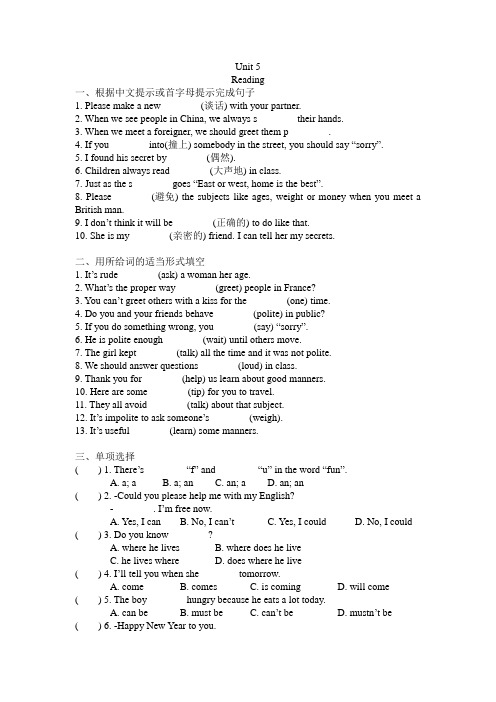
Unit 5Reading一、根据中文提示或首字母提示完成句子1. Please make a new________(谈话) with your partner.2. When we see people in China, we always s________their hands.3. When we meet a foreigner, we should greet them p________.4. If you________into(撞上) somebody in the street, you should say “sorry”.5. I found his secret by________(偶然).6. Children always read________(大声地) in class.7. Just as the s________goes “East or west, home is the best”.8. Please________(避免) the subjects like ages, weight or money when you meet a British man.9. I don’t think it will be________(正确的) to do like that.10. She is my________(亲密的) friend. I can tell her my secrets.二、用所给词的适当形式填空1. It’s rude________(ask) a woman her age.2. What’s the proper way________(greet) people in France?3. You can’t greet others with a kiss for the________(one) time.4. Do you and your friends behave________(polite) in public?5. If you do something wrong, you________(say) “sorry”.6. He is polite enough________(wait) until others move.7. The girl kept________(talk) all the time and it was not polite.8. We should answer questions________(loud) in class.9. Thank you for________(help) us learn about good manners.10. Here are some________(tip) for you to travel.11. They all avoid________(talk) about that subject.12. It’s impolite to ask someone’s________(weigh).13. It’s useful________(learn) some manners.三、单项选择( ) 1. There’s________ “f” and________ “u” in the word “fun”.A. a; aB. a; anC. an; aD. an; an( ) 2. -Could you please help me with my English?-________. I’m free now.A. Yes, I canB. No, I can’tC. Yes, I couldD. No, I could ( ) 3. Do you know________?A. where he livesB. where does he liveC. he lives whereD. does where he live( ) 4. I’ll tell you when she________tomorrow.A. comeB. comesC. is comingD. will come ( ) 5. The boy________hungry because he eats a lot today.A. can beB. must beC. can’t beD. mustn’t be ( ) 6. -Happy New Year to you.-________.A. Thank youB. You’re welcomeC. The same to youD. Thank you all the same( ) 7. ________you study, ________you’ll learn.A. Harder, moreB. The harder, moreC. Harder, the moreD. The harder, the more( ) 8. -What about going out for a walk?-________. But it’s very hot today.A. Yes, I wouldB. It sounds niceC. That’s rightD. I don’t thinkso( ) 9. I really don’t know________when I am in Britain.A. how to doB. how to sayC. what to doD. what to do it ( ) 10. -Would you like another piece of cake?-________A. No, I don’t want.B. Yes, give me please.C. Certainly, I like.D. No, thank you.( ) 11. Drivers________wear the safety belt when driving. This is the traffic rule.A. canB. mayC. willD. must( ) 12. Lucy is shy. She would not invite her classmates________dancing with her.A. practiseB. practisesC. practisingD. to practise( ) 13. You will be late for school________you don’t get up early.A. butB. isC. andD. or( ) 14. ________is really hard________them to climb such a high mountain.A. This; toB. It; toC. This; forD. It; for四、句型转换1. Jenny has recently visited the UK.(对画线部分提问)________ ________recently visited the UK?2. They are going to talk about manners in the UK.(对画线部分提问)________are they going to________?3. They say “nice to meet you” when they meet you for the first tome.(对画线部分提问)________do they________when they meet you for the first time?4. You can’t touch others in a line.(祈使句)________ ________others in a line.5. He is too young to go to school.(同义句转换)He isn’t________ ________ ________go to school.五、翻译句子1. 在别人前面插队是不礼貌的。


⽜津译林版英语⼋年级上册Unit5Reading精品教案Unit5 Reading精品教案教材分析“Reading”部分A,学习⼀篇⼤熊描“希望”的成长过程的⽂章,同时学习新的词汇,训练从上下⽂猜测⽂章⼤意的⽅法。
通过这篇⽂章的学习,增强学⽣保护野⽣动物的意识,让他们学习从⾃我做起,保护⽣态环境。
教学⽬标基础知识掌握词汇:mean, face, however, action, beginning ,serious, result, law,none, sadly, mainly, danger 词组:be born, look like, not... any more ,look after herself, live on, as a result, in dangertake action, right away, at birth, at four months old, in the beginning, face serious problems句型:When Xi Wang was born, she weighed just 100 grams and looked like a white mouse.Eight months later, she was not a small baby any more.Giant pandas live mainly on a special kind of bamboo.As a result, pandas may not have a place to live or food to eat.基本技能1阅读有关⼤熊猫的⽂章,了解⼤熊猫的成长过程及保护⼤熊猫的措施。
2培养学⽣根据上下⽂猜测词义的能⼒。
3通过⽂章学习来增强学⽣保护野⽣动物的意识。
综合素质利⽤所学内容,了解⼤熊猫的成长过程及保护⼤熊猫的措施,增强学⽣保护野⽣动物的意识。



Unit 5Wild Animals Reading教案(一)总课题8A Unit 5WildAnimals总课时第课时课题Reading 课型New教学目标知识目标1.Be able to understand and use the words andphrases to describe the giant pandas’ appearance andtake actions to protect them。
2.To to realize we must try our best to protect pandas.3.To know the growth of Xiwang and how to protectthem.能力目标Through the posts to enhance students' learning protectwildlife consciousness.情感目标Through the posts to enhance students' learning protectwildlife consciousness.教学重点1.To understand the main idea of the article.2.To learn how to take actions to protect the wild animals教学难点1.To understand the main idea of the article.2.To learn how to take actions to protect the wild animals课前预习1Preview the new words.2Listen to the tape and read the text教学过程教学环节教师活动二次备课Step 1. Warm up Step 2.Pre-readingStep3.While-reading 1.To check the preposition2.To talk about some wild animals.T: Can you tell me which is your favourite w ild animal?And can you tell me which is my favourite wild animal?T: Do you know why I like giant pandas best ? Because giant pandas are very lovely. They look like white mice when they were born. They look like bears when they grow up. They are friendly , too. They like eating bamboo leaves and shoots. They seldo m eat meat or hurt other animals. But it’s a pity that there are not many giant pandas in the world. They’re in danger. Hunters catch them and kill them for their fur . And farmers cut down trees and forests. So they have nowhere to live. We should take actions to protect them.(let Ss read the words after the teacher)T: Here is a story of Xi Wang, a very lovely giant panda. Would you like to read it with m e? Now open your books, turn to P.60. Read it quickly and answer the following questions .1) What’s the story about?2)What will happen to giant pandas if we do nothing?Step4Post-readingStep5 SummaryStep6. Homework T: Now , listen to the tape and read after it and then answer the six questions on the screen . Then encourage the students to find the main ideas about this story.T: Now Let’s find the main ideas together and put them on the blackboard.T: Look at the screen . Finish the table of “The growth o f Xi Wang”. Catch more details about XiWang.T: Now please read the passage together . Then finish the exercises on P. 61 Part B And Part C.T: Now , We’ve known the giant pandas very well , They are very lovely and we love them very much . But th ere are fewer and fewer pandas in the world . They’re in danger . Do you know why? Now,work in groups and find out “What problems can a giant panda meet in its life?”Then ask some able students of each group to talk in front of the class. After that,finish the Note-making 2 on the screen. T: Discuss with your partners: What other problems will the giant pandas have? What actions can we take ?And can you have a face to face interview about pandas?Teacher makes a summary that we should take actions to protect gian t pandas.1.Write an article about “what’s the relationship between wild animals and human beings?”2.Finish the exercises of reading教学反思总课题8A Unit 5Wild Animals 总课时第课时课题Reading 课型New教学目标知识目标1.Learing and using the language points2.To develop the Ss’ abilities of using English3.To train the Ss’ ability of learning by doing.能力目标To train the Ss’ ability of learning by doing.情感目标To learn how to take actions to protect the wild animals 教学重点Retell the reading and use the language points correctly.教学难点Retell the reading and use the language points correctly.课前预习Listen to the tape and read the text Revise the ways to give directions教学过程教学环节教师活动二次备课Step1 RevisionStep2 Language points 1 Say something about giant pand as2 Finish the table about the growth of Xiwang3 Review what danger giant pandas meet and what actions we can take4. Fill in blanks with proper forms.Explain the following language points to students1.be in danger.Many wild animals are in danger.2. She grew into a healthy young giant panda and weighed 35 kilograms. grow into意为“长成----”“发展成----”,其中grow作行为动词;weigh v.称重weighed weight n.重3.encourage sb to do sth.The English teacher always encourages me to speak more in class.4. following adj.We must take the following actions to learn English well.5. have nowhere to liveIf farmers cut down trees and forests, giant pandas will have nowhere to live.6.At the very beginning, XiWang drankhermother’s milk for up to 14 hours a day.at th e very beginning 在开始时At the very beginning, I didn’t like maths.Up to意为“高达,达到,一直到”。


初中英语牛津译林版七年级下册Unit5《Reading1: The ghost in the park》优质课教案省级比赛获奖教案公开课教师面试试讲教案【名师授课教案】1教学目标Teaching aims and learning objectivesBy the end of the lesson, students should be able to:1. learn about the unusual thing that happened to Millie and Amy;2. use reading skills to guess the meanings of the new words, to get the general idea a nd details.2教学过程2.1第一学时学时重点New words and phrases: as, usual, suddenly, anybody, nobody, reply, strange, leave, qui ckly, happen, everything, wonder, carefully, search, himself, weak, pick, surprised, la ter, somebody, whisper, bush, miaow, as usual, turn around, on one’s/the way, say to o neself, pick up, take … to, the animal centre, run away学时难点1. Many past forms of verbs in the story;2. Reading skills to get the general idea and details.教学活动1【导入】Teaching proceduresStep 1 Lead-inT: Look at the screen. How do you feel?1. Are there any ghosts in the world?2. Are you afraid of ghosts?3. Do you like reading ghost stories?【设计意图:通过图片和自由交谈引出本文的主题——鬼故事。

《新版英语八年级下册Unit5SectionA教学指南教案》。
一、教学目标1.掌握并运用本节课所学的动词短语;2.能够运用所学的动词短语,描述自己和他人的兴趣爱好;3.通过听、说、读、写等多种方式,提高学生的英语综合能力。
二、教学重点本节课的教学重点是掌握并运用所学的动词短语,如“go skiing”、“play basketball”、“listen to music”等,提高学生的英语交际能力,培养学生的听、说、读、写等多种语言技能。
三、教学难点本节课的难点是如何通过运用所学的动词短语,精确地描述自己和他人的兴趣爱好,加深学生对英语交际的理解和认识,提高学生的英语交流能力。
四、教学方法和手段本节课要采用多种教学方法和手段,如听力训练、口语训练、阅读训练和笔头训练等,使学生在不同的语言环境中进行综合性的语言实践,以提高学生的英语综合能力。
五、教学内容安排本节课的教学内容安排如下:1.复习上节课学过的内容,帮助学生们巩固所学;2.引导学生学习本节课所要掌握的动词短语,帮助学生们理解并记忆所学内容;3.进行听力训练,帮助学生们提高听力技能;4.进行口语训练,练习运用所学内容进行日常交流;5.进行阅读训练,帮助学生们提高阅读理解能力;6.进行笔头训练,帮助学生们提高英语书写能力。
六、教学方法和实践为帮助老师们更好地理解本节课的教学方法和实践,下面将对每一项具体内容进行阐述:1.复习上节课学过的内容本节课的复习内容应该包括上节课所学的重点知识点,如动词的时态、形式等,帮助学生们巩固记忆并理解所学识。
2.引导学生学习本节课所要掌握的动词短语本节课所要掌握的动词短语应该通过看图识词的方法进行引导学生学习,同时要结合实际情况,让学生通过图片和实物来理解和记忆所学内容。
3.进行听力训练听力训练是英语学习过程中必不可少的一环,能够有效提高学生的听力技能和理解能力。
在听力训练过程中,应该根据学生的实际情况调整训练难度,逐渐提高难度,帮助学生们适应英语听力的速度和语音。

Reading(2)Teaching aims:(1)to make students learn some words and phrases.(2)To make students learn more about ORBISTeaching importances and difficulties:(1)new words:operate v 做手术i ndeed adv 真正地,确实proud adj 自豪的medicine n 医学,药treat v 治疗,对待improve v 改善,提高carry on 继续开展(2)phrasesOperate on sbhard worksuch an importan t jobbe proud to do sthsomething elsecarry on with sthby d oing sth(2)sentencesHow do people feel about their work?(1)What does ORBIS need to carry on with their work?what can we do for them?Step two :teach them phrases and translate some sentences:Operate o n sb=perform an operation on sb=perform operations on sb马医生在飞机上给150 为病人做手术。
used to do sthbe used to do sthbe used to doing sth我过去常常一天只做两或三个手术我习惯于在中饭前出去。
我们需要很迅速地工作,但喔唷经习惯了。
So…that…Such…that…。
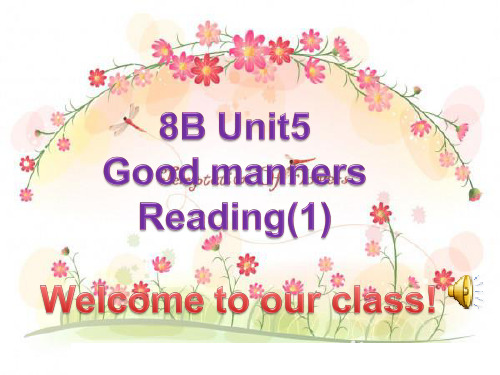
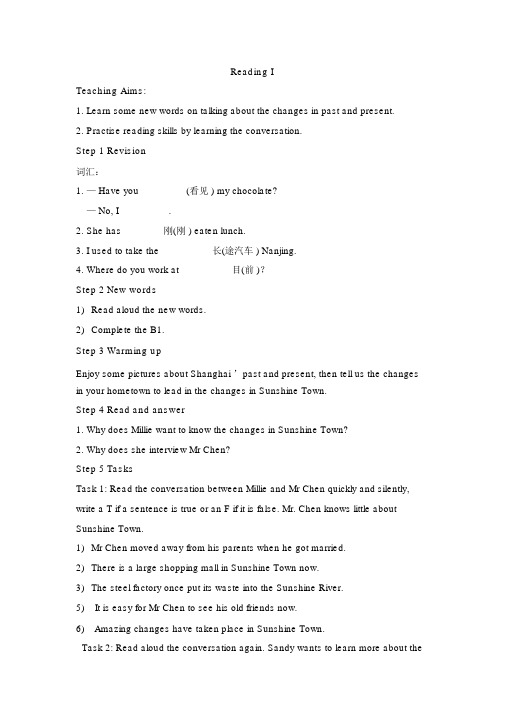
Reading ITeaching Aims:1.Learn some new words on talking about the changes in past and present.2.Practise reading skills by learning the conversation.Step 1 Revision词汇:1.— Have you ________ (看见 ) my chocolate?— No, I _________.2.She has _______ 刚(刚 ) eaten lunch.3.I used to take the _________ 长(途汽车 ) Nanjing.4.Where do you work at _________ 目(前 )?Step 2 New words1)Read aloud the new words.2)Complete the B1.Step 3 Warming upEnjoy some pictures about Shanghai ’past and present, then tell us the changes in your hometown to lead in the changes in Sunshine Town.Step 4 Read and answer1.Why does Millie want to know the changes in Sunshine Town?2.Why does she interview Mr Chen?Step 5 TasksTask 1: Read the conversation between Millie and Mr Chen quickly and silently, write a T if a sentence is true or an F if it is false. Mr. Chen knows little about Sunshine Town.1)Mr Chen moved away from his parents when he got married.2)There is a large shopping mall in Sunshine Town now.3)The steel factory once put its waste into the Sunshine River.5)It is easy for Mr Chen to see his old friends now.6)Amazing changes have taken place in Sunshine Town.Task 2: Read aloud the conversation again. Sandy wants to learn more about thehistory of Sunshine Town. She is asking Millis some questions. Work in pairs. Complete their conversation.Sandy: Tell me more about your interview with Mr Chen, Millie. Has he lived in Sunshine Town all his life?Millie: Yes. He first lived with his parents in the ____________ part of town, and then moved to another flat two _________ away.Sandy: What was the town like in the past?Millie: There were some small ____________ and shops.Sandy: What did Mr Chen say about the town centre?Millie: Years ago, there was a __________ and a _______. Now there’ s a new park, a new ________ and a large ______________.Sandy: Were there any factories in Sunshine Town?Millie: Yes. There was once a ___________ near the Sunshine River.Task 3: Millie is going to write about the changes in Sunshine town for her history project. She has made some notes. Help her complete the sentences with the information.Sunshine Town (1)_________________ over the years.People now have (2)_________________ town.The (3)______ from the steel factory was once a problem. Luckily,thegovernment took action to improve the (4)_________.Old people used to (5)__________________________ together.Old people sometimes (6)_______________ because they cannot(7)________________ as often as before.People think it is good to see (8)_____________________________.Step 6 ReadListen to the recording and read the passage following the tape.Homework1.Read aloud the conversation in pairs.2.Find out the difficult sentences and discuss them with your classmates.。